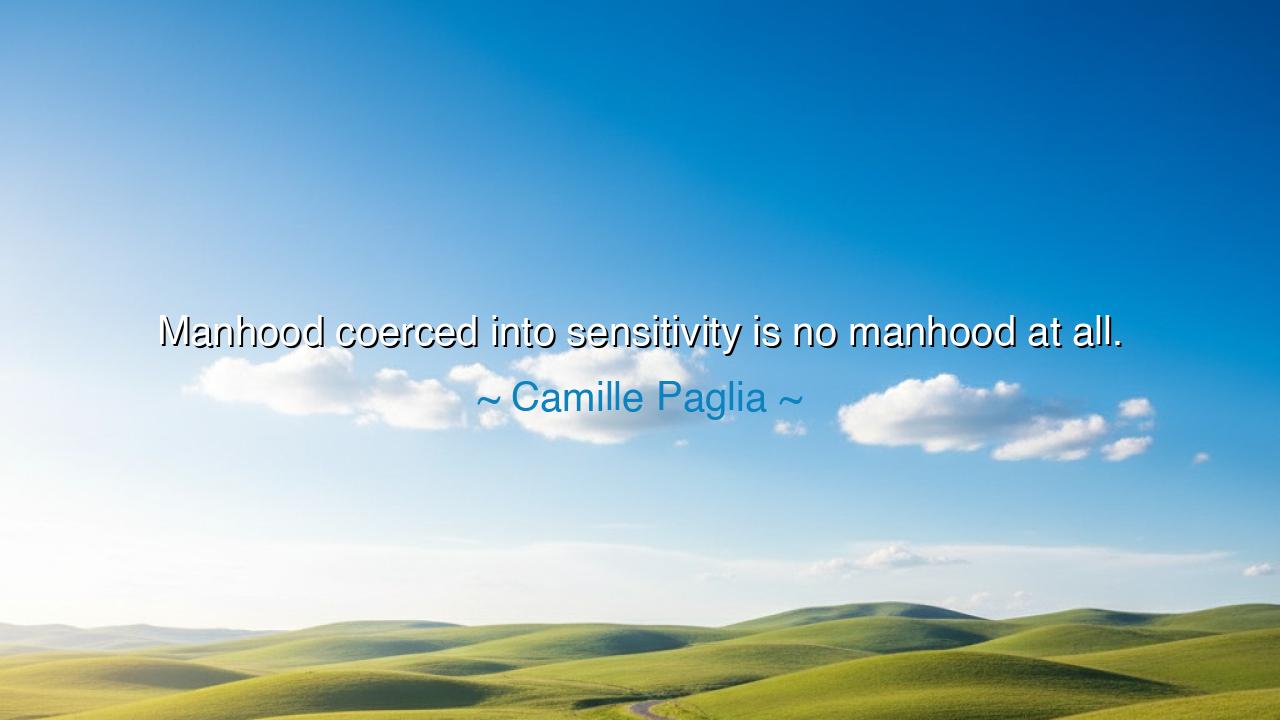
Manhood coerced into sensitivity is no manhood at all.






The fierce words of Camille Paglia, “Manhood coerced into sensitivity is no manhood at all,” strike like iron upon the anvil of truth. They speak to the eternal tension between strength and softness, between the primal and the polished, between the warrior and the healer that dwell within the soul of man. Paglia, a scholar of art, culture, and human nature, calls not for cruelty but for authenticity. Her warning is clear: when manhood is forced, when it bows to the dictates of fashion or fear rather than the voice of its own spirit, it ceases to be genuine. True masculinity, she teaches, must be chosen, not imposed; it must grow from the heart, not from societal instruction.
In every age, there are forces that seek to reshape the image of man—to tame his wildness, to dull his instinct, to replace his natural passion with a rehearsed politeness. The modern world, in its quest for civility, often forgets that it is the untamed spirit of man that has built civilizations, crossed oceans, and defended the weak. Sensitivity, when born from compassion, is noble; but when demanded through shame or fear, it becomes a hollow mask. To be told how to feel, how to weep, how to restrain one’s fire for the comfort of others—this is not evolution but emasculation. Paglia’s words rise as a defense of the authentic masculine soul, not one of violence, but one of uncorrupted strength.
Consider the story of Ernest Shackleton, the explorer who led his crew through the frozen wastelands of Antarctica. When his ship, the Endurance, was crushed by ice, he did not collapse beneath despair or yield to tears for show. He bore his agony in silence, yet his every act was fueled by compassion and resolve—for his men, not for himself. He was not gentle because the world demanded it; he was compassionate because his heart commanded it. Shackleton’s sensitivity was not coerced—it was forged in fire. That is what Paglia means: manhood is at its most beautiful when its kindness is chosen, not compelled.
The ancients knew this truth well. The Greeks revered Achilles, whose fury was divine, but they also mourned his fall when his wrath overtook reason. The Romans honored Cincinnatus, who wielded power with strength but returned to his plow when duty was done. These were men who felt deeply, but their emotions were never dictated by fashion—they arose from principle. Paglia’s insight reminds us that to weaken man’s instinctive force in the name of conformity is to strip him of his sacred essence. The lion cannot be taught to purr like a cat and still remain a lion.
In truth, sensitivity itself is not the enemy—coercion is. A man who cannot feel is incomplete, but a man who is told what to feel becomes a shadow of himself. The modern age often mistakes sentimentality for virtue, yet a virtue that is compelled loses its purity. Real strength lies in balance—the ability to feel without surrendering to weakness, to love without abandoning courage. When men are shamed for their instincts, they grow hollow and uncertain, and a society of hollow men soon loses its guardians, its builders, its dreamers. A world that denies masculine truth also denies the fire that protects it.
Paglia’s quote stands as both a challenge and a call to restoration. She calls for a reclaiming of authenticity—a return to the raw, elemental nature of man, unashamed of his passion, his drive, his protective instinct. The world does not need softer men; it needs truer ones—those who are both fierce and tender, strong yet kind, resolute yet understanding. For true sensitivity, born from inner conviction, is not weakness but mastery. It is the sword that defends, not the blade that bends.
So let this teaching be passed to the sons of the future: do not let the world dictate the rhythm of your heart. Be gentle when your spirit moves you, be fierce when duty calls, but never let either be forced upon you. The measure of a man is not how well he imitates softness, but how fully he embodies truth. Remember that manhood is not a costume to be worn for approval—it is a calling to be lived with courage. For as Paglia reminds us, the man who must be told how to feel has already forgotten what it means to be alive.






AAdministratorAdministrator
Welcome, honored guests. Please leave a comment, we will respond soon